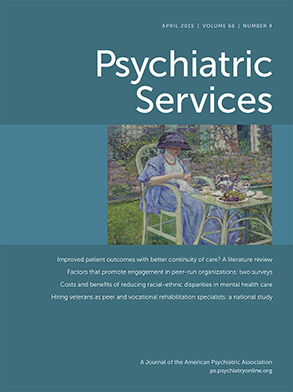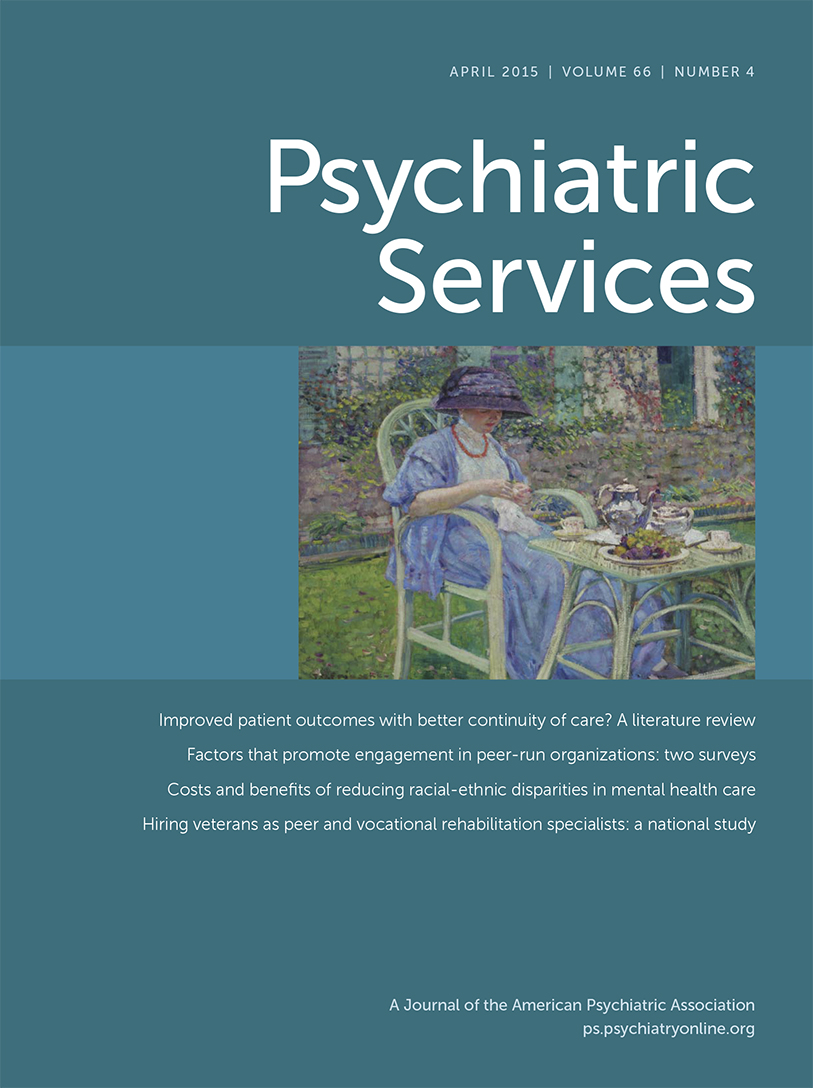Maria Oquendo voted new APA president-elect: Members of the American Psychiatric Association (APA) have elected Maria A. Oquendo, M.D., as APA’s next president-elect. Dr. Oquendo is residency training director at the New York State Psychiatric Institute in New York City. She is also professor and vice-chair for education at Columbia University, where she conducts research on mood disorders and suicide. Dr. Oquendo currently serves on APA’s Board of Trustees as APA secretary and chairs APA’s Conflict of Interest Committee. Members also elected a new APA secretary, Altha J. Stewart, M.D., of Memphis, Tennessee. Dr. Oquendo will officially become president-elect on May 20 at the close of this year's APA annual meeting in Toronto, at which time the current president-elect, Renée Binder, M.D., of San Francisco, will succeed Paul Summergrad, M.D., as president.
APA’s new consumer guide to DSM-5: On April 28, APA will release
Understanding Mental Disorders: Your Guide to the DSM-5. The guide adapts
DSM-5 language into clear and concise descriptions of disorders to provide laypersons with medically accurate information about mental and substance use disorders. A separate chapter focuses on treatment essentials. For each disorder, the guide describes specific symptoms, risk factors and warning signs, related disorders, and treatment options. Each chapter in the 370-page guide features a patient’s story illustrating how symptoms affected the person and his or her family and describing the steps that led to diagnosis and treatment. The guide also includes tips to promote mental health, a list of medications, and contact information for support groups. The first chapter on childhood disorders is followed by chapters on psychotic disorders, bipolar disorders, depressive disorders, anxiety disorders, obsessive-compulsive disorder, trauma and stress disorders, dissociative disorders, somatic symptom disorders, eating disorders, elimination disorders, sleep-wake disorders, sexual dysfunctions, gender dysphoria, disruptive and conduct disorders, addictive disorders, dementia and other memory problems, personality disorders, and paraphilic disorders.
Understanding Mental Disorders: Your Guide to the DSM-5 can be ordered on the Web site of American Psychiatric Publishing (
www.appi.org).
APA calls for integrated care training in residency programs: The APA has released new training recommendations that call for residency programs to educate the next generation of psychiatrists in integrated behavioral health care in order to reduce health care costs and improve access to mental health services. Also included are recommendations for undergraduate medical education and for the continuing medical education of practicing psychiatrists, many of whom completed residency training when solo practice was the primary model of care. The recommendations are designed to break down barriers between mental health and general medical health and to support psychiatrists’ work in tandem with primary care doctors to address a patient’s total health care. Key recommendations for residency programs include ensuring an emphasis on interspecialty education to help physicians develop the attitudes and skills necessary for collaborative practice. Undergraduate training programs are encouraged to provide early exposure to primary care settings that effectively integrate behavioral health care. Graduate medical education programs should train faculty members to teach and supervise residents in integrated care models and advocate for collaborative practice in their institutions. The recommendation will be sent to 219 general psychiatry training programs across the United States and Canada. More information on the recommendations and the APA report from which they are derived is available on the APA Web site (
http://www.psychiatry.org).
Wayne Katon, pioneer in collaborative care: Wayne Katon, vice-chair of the Department of Psychiatry and Behavioral Sciences at the University of Washington (UW) and a pioneer in collaborative mental health care, died March 1 from lymphoma at the age of 64. Dr. Katon joined the UW faculty in 1979 and established the Division of Health Services and Psychiatric Epidemiology, where he spent 35 years as a clinician, teacher, and researcher. Thomas Insel, M.D., director of the National Institute of Mental Health, paid tribute to Dr. Katon on a recent Director’s Blog (
www.nimh.nih.gov/about/director/2015/collaborative-care.shtml), where he wrote, “Our field has lost a brilliant, effective, innovative leader. Wayne led the team that conducted the first large randomized controlled trial of the collaborative care approach for depression. Since its original publication in JAMA in 1995, randomized controlled trials around the world, more recently in low- and middle-income countries, have validated the effectiveness of this approach.” A tribute posted on the UW Health Sciences Web site (
hsnewsbeat.uw.edu/story/wayne-katon-who-expanded-care-mental-health-dies) notes that during his residency in the late 1970s, Dr. Katon did an elective rotation in family medicine and began to recognize that most people with depression and anxiety never got treatment. “I saw that if we could empower the primary-care system to improve the recognition and quality of treatment, we could have a tremendous public health impact, more so than I could as a psychiatrist seeing individual patients,” he said. The Wayne Katon Memorial Fund has been established to support the next generation of physician students (depts.washington.edu/givemed/give/?page=make&source=wkaton).
Change Direction campaign launched: First Lady Michelle Obama addressed 500 mental health leaders and advocates at the launch in early March of a mental health campaign called Change Direction. Change Direction brings together concerned citizens, leaders of nonprofit and private sector organizations, and other stakeholders to create a new story about mental health, mental illness, and wellness in America. Campaign leaders plan to spark a movement that helps Americans understand that mental health has equal value to physical health, that creates a common language allowing people to recognize the signs of emotional suffering in themselves and others, and that encourages people to care for their mental well-being and that of others. The campaign focuses on five signs of emotional suffering: withdrawal, agitation, hopelessness, decline in personal care, and change in personality. Target audiences include military personnel, veterans, and their family members; corporate and government employees; first responders; students, teachers, school officials, and coaches; and health care professionals. The initiative was inspired by discussions at the White House National Conference on Mental Health in 2013, which was convened after the Newtown tragedy. The American Psychiatric Foundation, APA, and American Psychiatric Publishing are founding members of the campaign. More information is available on the Change Direction Web site (
www.changedirection.org).
CIHS policy brief looks at integrated care in five community health centers: A new report from the SAMHSA-HRSA Center on Integrated Health Solutions (CIHS) describes critical steps taken by five community health centers (CHCs) in California toward creating “one-stop shopping” for both general medical and behavioral health care. To identify the steps, the report’s authors examined quantitative and qualitative data from a questionnaire, a rating tool, and site visits or telephone interviews with the medical directors and staff at the five CHCs. The report focuses on four critical steps taken by each CHC to increase integration: employing behavioral health providers, using a single electronic health record that includes both general medical and behavioral health data, transforming the physical space, and developing mechanisms for effective transition of patients between providers (for example, a “warm handoff”). The findings emphasize the importance of changes to policies to promote reimbursement for same-day visits, as well as the importance of cultural changes to integrate behavioral health care. The report highlights the need for tools to assess and promote integration and to identify solutions for the most challenging activities required to achieve full integration. The eight-page policy brief,
One-Stop Shopping: Efforts to Integrate Physical and Behavioral Health Care in Five California Community Health Centers, is available on the CIHS Web site (
www.integration.samhsa.gov/news/articles/2015/02/20/one-stop-shopping-integrated-care-in-five-community-health-centers).
CHCS brief on potential financing models to promote integration of health care and social services: Research has shown that social factors, such as housing, employment, education, access to healthy food, and community participation, have a profound effect on health. Integrating general medical care and social services has the potential to improve health and reduce costs for disadvantaged populations served by state Medicaid programs. Many Medicaid programs are taking steps toward greater integration of clinical and nonclinical services. However, Medicaid is limited in the types of nonclinical services that it can fund. Currently, Medicaid dollars must be combined with other funding sources to pay for comprehensive integration efforts. The Center for Health Care Strategies (CHCS), with support from the Commonwealth Fund, has released a brief that reviews potential financing mechanisms to facilitate integration, with a particular focus on Medicaid. Drawing from interviews with experts, it describes models ranging from one-time seed funding for pilot projects to Medicaid 1915(c) waivers and blended or braided financing arrangements. The brief also highlights payment methodologies designed to influence providers to incorporate social services into their care programs, with a focus on moving away from fee-for-service models and toward value-based payment strategies, such as global budgets. The 16-page brief,
State Payment and Financing Models to Promote Health and Social Service Integration, is available on the CHCS Web site (
www.chcs.org/resource).
CHCS guide to hiring and training care managers: Care managers are essential to the success of integrated care programs. CHCS has published a technical assistance brief that describes strategies for hiring and training care managers in programs serving Medicare-Medicaid beneficiaries and in other programs that serve individuals with high general medical, behavioral health, and social service needs. The strategies have been used effectively by health plans in five states—Wisconsin, Minnesota, Hawaii, Tennessee, and New York. Using data from interviews with staff in the five plans, CHCS identified the following broad strategies to guide hiring and training of care managers: hire diverse staff with strong community connections; develop tailored training approaches that provide foundational skills, address members’ diverse needs, and incorporate state resources; use multiple training modes tailored to each new hire; align training programs and staff across integrated care programs; dedicate staff or departments exclusively to training; standardize training of care managers while allowing for flexibility; address new program requirements and issues in ongoing training; and cultivate internal feedback mechanisms through open dialogue and shared learning. The 12-page brief,
Strategies for Hiring and Training Care Managers in Integrated Programs Serving Medicare-Medicaid Beneficiaries, is available on the CHCS Web site (
www.chcs.org/resource).
Urban Institute details King v. Burwell implications: A two-page summary developed by the Urban Institute uses bold graphics to present implications of a Supreme Court finding for the plaintiffs in
King v. Burwell, which challenges a key component of the ACA. Of the 9.3 million people who would lose tax credits, two-thirds would become uninsured. Another 4.9 million would face large premium increases in marketplace plans, and about a quarter of them would also become uninsured. Thus an additional 8.2 million people would be uninsured in 2016—three-quarters are low or middle income, over 60% are non-Hispanic white, over 60% live in the south, and more than three-quarters of the adults have jobs. The summary is available on the Urban Institute Web site (
www.urban.org/publications/2000124.html).

